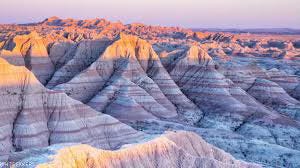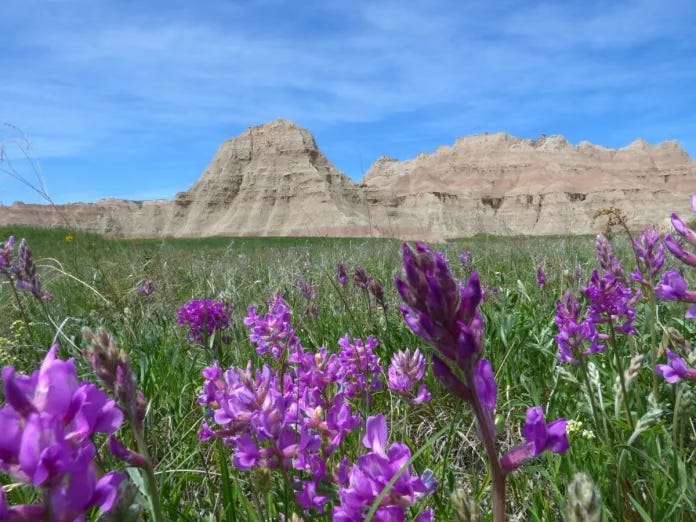The desert and the parched land will be glad;
The wilderness will rejoice and blossom.
Isaiah 35:1
While in college, I drove across South Dakota to visit Badlands National Park. The Lakota people called it "Mako Sica," which translates "land bad," referring to the stark landscape with sharply eroded buttes, deep gorges, and steep canyons. It is a great film site for movies like "Wyatt Earp" and "Dances with Wolves." The landscape is so surreal that several sci-fi movies have also been filmed there.
After eight hours of driving across the flat Dakota plateau, I was stunned by what I saw. The panorama before me was not barren but covered with green grass and bright purple flowers. It was a wet year, and the desert had blossomed. Since I anticipated stark beauty, I couldn't tell if I felt more awe or disappointment.
Sometimes, hope can be so surprising we can't quite grasp that it is real. The good news takes our breath away. The cancer is gone, the marriage proposal finally happened. You made your last student loan payment. The wilderness rejoices and blooms. Occasionally, history surprises us with the fall of the Berlin Wall. I also remember New Year's Eve in 2000, when Nelson Mandela lit a candle in his former prison cell. Apartheid was finally ending, and a parched land became glad. Moments we never expected to see became reality.
Isaiah 35 sounds wonderfully hopeful, but it is easy to feel that it is not for us. If you live long enough in the Badlands, it is hard to believe they will ever blossom. Many scholars think Isaiah wrote this poetry in a time of national despair. The Assyrians had conquered northern Israel and posed a constant threat of invasion. A gloom hung over the nation. So, Isaiah may have been writing to remind people to trust and hope that God had not forgotten them.
Are you more hopeful or worried about the future? We are holding our breath to get through the election on November 5. It is like waiting for a biopsy to see if we have cancer or not. We may despair that our divisions are so great that elections don't solve things anymore. We wonder if we have lost our ability to do big things together because we don't trust each other. How can we live in hope with so much uncertainty and division?
Some of us are more hopeful as a disposition. Do you know the difference between an optimist and a pessimist?
Pessimist: Sees the glass as half empty and probably thinks the water is contaminated. Optimist: Sees the glass as half full and believes there are probably free refills.
Pessimist: Wakes up and thinks, "Great, another day for everything to go wrong."
Optimist: Wakes up and thinks, "Wow, another day to make questionable decisions with enthusiasm!"
Pessimist: Believes that every silver lining has a dark cloud attached to it. Optimist: Believes that every dark cloud has a silver lining, plus a rainbow and maybe a pot of gold if they look hard enough!
I think I am a pessimistic optimist. A pessimistic optimist is the one who thinks, "I'm sure everything will work out, but let's be honest, we'll probably run out of snacks before it does." I cannot take credit for this term. It was coined by Reinhold Niebuhr, the author of the Serenity Prayer, about changing what we can and accepting what we can't. Niebuhr believed that because we are human, limited, and mortal, there is good reason for pessimism. But because God is good, and God is love, there is reason for hope and optimism. Our hope in God outweighs our human limits; therefore, we live as pessimistic optimists.
I know things can go terribly wrong. I lived through a major car crash when I was five. My Dad survived a plane crash and then died of cancer. I have had six surgeries and almost died from a perforated intestine. I grew up in the farm crisis; I went through a divorce. A family was murdered in my first church, and I ran a homeless shelter for eight years. I know life can go very, very wrong because I have done the funerals.
And yet, my blood type is B Positive, so optimism is in my blood. I would rather be hopeful and risk being wrong than be cynical and right. With pessimism, you lose either way. Hope is something more than being optimistic and thinking things will be OK. Some things won't be OK. Hope is a trust in the possibility that all is not lost, that there is meaning even in suffering, that God can make a way when it feels like there is no way. The Christian faith proclaims a God of second chances. In his second letter to the Corinthians, Paul encourages them, "Therefore we do not lose heart. Though outwardly we are wasting away, yet inwardly we are being renewed daily."
Hope doesn't come from evidence but trusts God despite all the evidence. The Apostle Paul said, "But hope that is seen is no hope at all. Who hopes for what they already have? But if we hope for what we do not yet have, we wait for it patiently." (Romans 8:24-25, NIV)
Biblical hope is a mix of persistence and poetry. Jesus taught his followers to love in active and engaged ways. Doing small things with great love makes a difference. Even a small act of giving a cup of cold water matters. Do unto others as you would have them do unto you. Lead with proactive goodness; don't wait for others to step up. If you have the faith of a tiny mustard seed, you have enough to move mountains. Jesus did not tell his followers to wait on the mountaintop for the second coming but to live daily knowing that the Kingdom of God is near when we act in love.
So persist in love and acts of kindness. But we need some poetry to carry us through.
Then will the eyes of the blind be opened
and the ears of the deaf unstopped.
6 Then will the lame leap like a deer,
and the mute tongue shout for joy.
Water will gush forth in the wilderness
and streams in the desert.
7 The burning sand will become a pool,
the thirsty ground bubbling springs.
In the haunts where jackals once lay,
grass and reeds and papyrus will grow.
Isaiah 35:5-7
We need these words of poetry in our bloodstream to persist in love, even as our world is shrill and divided. We can acknowledge the gravity of our problems but still move towards a hopeful vision of the future. That is why we gather every Sunday to confess where we fell short, sing music that is good for the soul, hear words of encouragement, and know that we are not alone in our quest.
What is your hope? Here are a few things I shared specific to my congregation here in Maine. In the comments, share your hope. Sharing it publically brings hope to the forefront of your mind.
· I place hope in generous people. I pray that no one in our community will die of cold because the Fuel Fund and the Woodchucks provide backup support. I have faith that no one will be hungry because of the food pantry and the Community Frig. Active faith leads to hope.
· I hope for a community where you are not forgotten and where you can age with dignity. We are the oldest county in the oldest state, so actively engaging in this support matters to our mission. We can't move into the future in a way that leaves behind anyone growing older. That is why we have a robust online ministry, are working on handicap accessibility for our worship space, and take the time to visit and connect. We must be a church that is not afraid to face suffering and grief to be with people amid pain.
· I hope we can also be a multi-generational community. We must not give up on welcoming young families and children. At times, that may push us to change how we do things. We will need an attitude of curiosity, flexibility, and willingness to try new things to welcome a new generation. We must be learners as well as teachers.
· I hope we are a church confident enough to take risks and not afraid to fail at something. Gordon Crosby, one of my favorite preachers, often said he wanted to preside over more failures than any other pastor in America. Nobody gets the Holy Spirit right the first time around. We should always have an experiment to learn more about how to put our love into action. We have two experiments bubbling right now as we launch Supper and Spirit, a dinner church experience. We are also exploring a Green Team to work for creation justice. I hope to be a church that celebrates the wonder and awe of creation, and works to care for God's creation, and invites and advocates for others to do so.
Hope is the energy we need when we are weary. Even the desert can bloom, and what is barren can be filled with life. Leave here holding onto this promise, trusting that God can bring joy and renewal even to the wildernesses, even with contested elections, of our lives. Go forth with hearts open, hands ready and eyes focused to see new life spring forth.







Prayers for your Dinner Church ministry. We started one that was initially meaningful and successful until the pandemic hit. When things opened back up, the winds of the spirit took us in another direction. Blessings.
I appreciated the "B Positive" blood type comment. I am B Positive as well. Does that mean we have a natural tendency of seeing the glass half full?
The exercise of naming our hopes is a good one to do. I hope we live peaceful days after 11/5/24